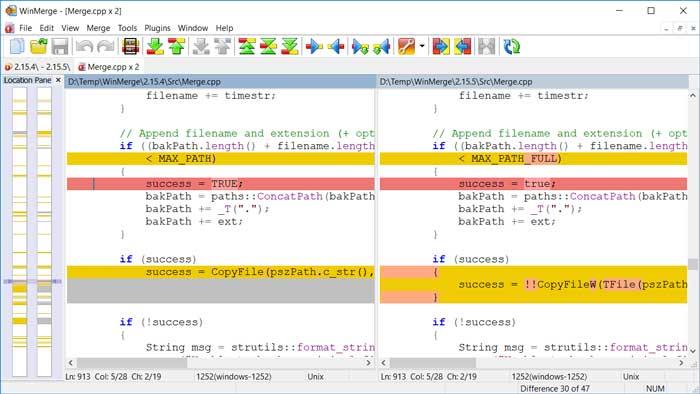
The final version was entirely written by Douglas McIlroy. The diff utility was developed in the early 1970s on the Unix operating system.
COMPARE TEXT FILES PATCH
The output is called a "diff", or a patch since the output can be applied with the Unix program patch. Modern implementations also support binary files. It is used to show the changes between two versions of the same file. It displays the changes made in a standard format, such that both humans and machines can understand the changes and apply them: given one file and the changes, the other file can be created. The diff utility is a data comparison tool that calculates and displays the differences between two files. You can choose whether you want to see the difference between two given texts by characters, words or lines. It will graphically show you the differences between the 2 textareas by highlighting those changed areas in red color.

Using the tool is super easy input the two texts in separate boxes and you can see the output right below. This tool provides an easy way to highlight the differences between the two inputted texts.
COMPARE TEXT FILES CODE
bin, but couldn't one start with an older version, like 1.0.Use this online free Code Diff Tool for comparing two text files. Now, I have no idea how difficult it is to create a second. bin file would not necessarily have to be included in the AHK installer package either it could be a separate download for those who want it.

COMPARE TEXT FILES PLUS
bin files would be ideal, but even two would be helpful: the original, full-featured one, plus a stripped down version without support for GUIs or any advanced commands such as DLLCall, Functions, or possibly Window Management commands.Īn additional. So forget the idea! :-PYou're right, several.
COMPARE TEXT FILES FULL
The compiler would pick only the needed files.īut to do so, it would need to be a full linker. one for the GUI, one for handling Windows, one for hotkeys, etc. Compiled with this version the above script is 147KB though, a little less than 20% reduction). bin to keep handy, because it adds several important commands, but is still before the addition of GUIs. bin file was chosen for these simple scripts, but in many cases I see a big advantage (v1.0.16 looks like a good candidate for an additional. One would have to learn the limitations of whichever old. That's a 40% reduction! I realize this old version doesn't support the SplitPath command or the A_Desktop variable, but these problems could be easily fixed. I doubt this is such a good idea, each version often correct some bugs, and the size increase isn't too much, I think.The above script compiled with v1.0.42.07 is 181KB versus compiled with v1.0.01 is 107KB. It's so small though, I'm not sure v1 even came with a compiler? Is there still a 1.0.0.0 version downloadable? :-)Yes there is, but I downloaded it a few times and it always came out corrupted. I downloaded several old AHK versions and tried out their respective. MsgBox, 48, Not Equal !, %i% differences were written to Desktop\%NoExt1%-vs-%NoExt2%.txt.Įlse MsgBox, 64, Equal, "%NoExt1%" and "%NoExt2%" are identical.I also noticed that compiling this script with AHK 1.0.42.07 makes it 1KB larger than when I originally compiled it with v1.0.42.03, even though the script itself is shorter! :x I know this size increase was discussed some time ago and it seemed trivial to me at first, but experiencing it firsthand tempts me to be the first "Yes" vote in the poll.

I was just looking back at a couple of my old scripts, and I realized how poorly written this one was, so I shortened it up quite a bit: #SingleInstance forceįileSelectFile, Path1, 3, Choose first text file:įileSelectFile, Path2, 3, Choose second text file:įileAppend, Line %A_Index%`r`n %NoExt1%> %line1%`r`n %NoExt2%> %line2%`r`n, %A_Desktop%\%NoExt1%-vs-%NoExt2%.txt


 0 kommentar(er)
0 kommentar(er)
